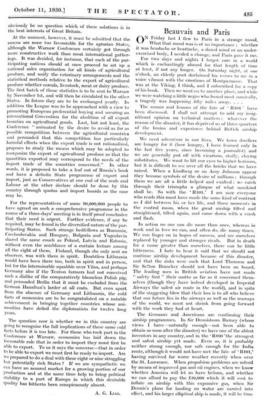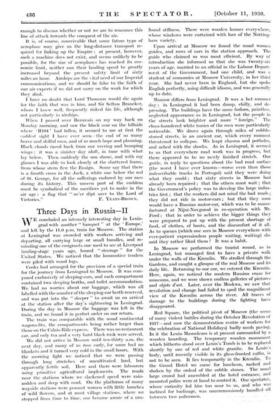Beauvais and Paris
(AN Friday last I flew to Paris in a strange mood. V What that mood was is of no importance : whether it was headache or heartache, a dazed mind or an under- exercised body, I needed a change, and Paris gave it Inc.
For two days and nights I forgot care in a world which is enchantingly absurd for that length of time at least, if not any longer. On Saturday night, at one o'clock, an elderly poet declaimed his verses to Inc in a voice vibrant with the emotions of Montpaniasse. That was at the Viking, I think, and I subscribed for a copy of his book. Then we went on to another place, and while we were watching a little negro who boxed most comically, a tragedy was happening fifty miles away. . . .
The causes and lessons of the fate of ' 11101 ' have been discussed. I shall not attempt to add my insig- nificant opinion on technical matters : whatever the reason of the disaster, it has deprived us of three-quarters of the brains and experience behind British airship development.
We need adventure in our lives. We town dwellers are hungry for it (how hungry, I have learned only in the last five years, since becoming a journalist.) and we are generally put off with vicarious, stuffy, cloying substitutes. We want to lift our eyes to higher horizons, but it is difficult to see over all the bricks that we have raised. When a Lindberg or an Amy Johnson appear they become symbols of the desire of millions : through them we are all a little helped and exalted : we catch through their triumphs a glimpse of what mankind shall be. So with the Mtn.' I um sure everyone who reads this must have made the same kind of contrast as I did between his or her life, and those moments in the control room, when the great airship tilted and straightened, tilted again, and came down with a crash and flash.
In action no one can die more than once, whereas in work and in love we call, and often do, die many times. We can linger on in hopes of success, and see ourselves replaced by younger and stronger rivals. But in death for a cause greater than ourselves, there can be little bitterness. I hate to hear it said that we should not continue airship development because of this disaster, and that the risks were such that Lord Thomson and Sir Sefton Braneker should not have been on board. The leading men in British aviation have not made " safety first" their motto as far as it concerned them- selves (though they have indeed developed in Imperial Airways the safest air route in the world), and in spite Of the staggering blow that their loss is to all who believe that our future lies in the airways as well as the seaways of the world, we must not shrink from going forward with the work they had at heart.
The Germans and Americans are continuing their airship programmes. In Sir Dennistoun Burney (whose views I have—naturally enough—not been able to obtain so soon after the disaster) we have one of the ablest inventors in any country, and in the MOO 'the strongest and safest airship yet made. Even so, it is probably neither strong enough, nor safe enough for the India route, although it would not have met the fate of '11101,' having survived far worse weather recently when over the St. Lawrence. When propulsion problems are solved by means of improved gas and oil engines, when we know whether America will let us have helium, and whether we can afford to pay the £40,000 which it will cost to inflate an airship with this expensive gas, when Sir Dennis's plans for landing on water are carried into effect, and his larger elliptical ship is made, it will be time enough to discuss whether or not we are to renounce this line of attack towards the conquest of the air.
It is, of course, conceivable that some future type of aeroplane may give us the long-distance transport re- quired for linking up the Empire: at present, however, such a machine does not exist, and seems unlikely to be possible, for the size of aeroplanes has reached its eco- nomic limit, neither can their landing speed he greatly increased beyond the present safety limit of Sixty miles an hour. Airships are the vital need of our Imperial communications, and we should be false to the faith of our air experts if we did not carry on the work for which they died.
I have no doubt that Lord Thomson would die again for the faith that was in him, and Sir Sefton Braneker, whom I knew well, frequently risked his life, although not particularly in airships.
When I passed over Beauvais on my way back on Monday morning, and saw the black scar on the hillside where '11101' had fallen, it seemed to me at first the saddest sight I have ever seen—the end of so many brave and skilful men, and of so much hope and planning. Black clouds raced back from our veering and bumping wings : it was a sinister day aloft, in tune with what lay below. Then suddenly the sun shone, and with my glasses I was able to look closely at the shattered frame, front whose stern flew the Ensign. Some say that there is a fourth cross in the Jack, a white one below the red of St. George, for all the sufferings endured by our race during its history. This unseen part of the emblem nutst be symbolical of the sacrifices yet to make in the air age : a flag that " ne'er dipt save to the Lord of









































 Previous page
Previous page